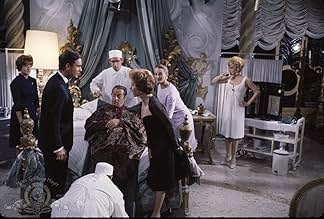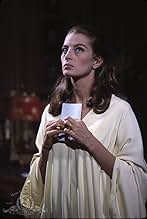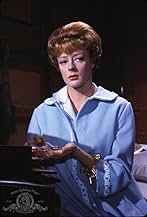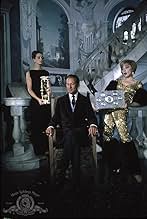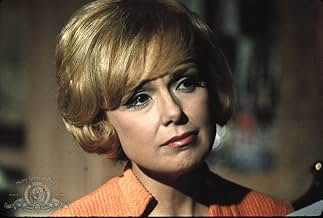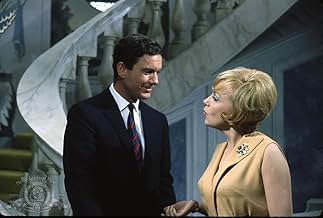AVALIAÇÃO DA IMDb
6,7/10
3 mil
SUA AVALIAÇÃO
Adicionar um enredo no seu idiomaIn Venice, a millionaire hires an actor to help him prank three greedy ex-girlfriends into thinking he's dying and leaving his fortune to one of them.In Venice, a millionaire hires an actor to help him prank three greedy ex-girlfriends into thinking he's dying and leaving his fortune to one of them.In Venice, a millionaire hires an actor to help him prank three greedy ex-girlfriends into thinking he's dying and leaving his fortune to one of them.
Herschel Bernardi
- Oscar Ludwig
- (cenas deletadas)
Massimo Serato
- The Pretender
- (cenas deletadas)
Jack Benny
- Violinist outside restaurant
- (não creditado)
Mimmo Poli
- Cook
- (não creditado)
Luigi Scavran
- Massimo
- (não creditado)
Enredo
Você sabia?
- CuriosidadesThe great Italian cinematographer Gianni Di Venanzo died suddenly of hepatitis (aged only 45) during the making of this movie, with many weeks of the five-month shooting schedule to go before completion. His operator, Pasqualino De Santis, took over as director of photography, but refused credit in this capacity, although he would quickly go on to international renown with his work for Luchino Visconti, Franco Zeffirelli, Joseph Losey, and others.
- Erros de gravaçãoNear the beginning, when Dominique is bent over drawing her bath, a shadow of the camera falls across her back.
- Citações
Merle McGill: After all, honesty is the best policy, right?
Inspector Rizzi: Debatable. But, at the moment I would appreciate it.
- Cenas durante ou pós-créditos"Based Upon: A Play by Frederick Knott and A Novel by Thomas Sterling - and A Play by Ben Jonson"
- ConexõesFeatured in Discovering Film: Rex Harrison (2015)
Avaliação em destaque
This is a very good film adaptation of a story that has had a number of permutations. The original source of the story dates to British poet and playwright Ben Jonson's (1572-1637) satirical play, "Volpone." Thomas Sterling's "Evil of the Day" was a 1955 novel, and playwright Frederick Knott then adapted that source into the play, "Mr. Fox of Venice."
The theme of the original work is carried through all the renditions of the story. It's a biting satire on greed, with a complex staged practical joke as the main plot. The comedy isn't of the rollicking laughter type, but in the exaggerations with the drama and the characters themselves. Most of the characters of the Ben Jonson play are carried through all renditions, except that in the 20th century story the three characters of avarice are women instead of men.
Director Joseph Mankiewicz does a masterly job of adapting and then directing the story, with an introduction and closing comments in voice over by the main character, Cecil Fox. He uses this technique very subtly for one other character toward the end. Another reviewer delighted in what he called the "Maltese Falcon" ending. It is fantastic in itself.
The film was made mostly in Rome, with some canal scenes shot in Venice. The producers assembled a first-rate cast to play the diverse roles. All give performances worthy of academy award nominations. Rex Harrison is superb as Cecil Fox, and Susan Hayward dominates her scenes as Mrs. Sheridan - Fox's "Lone Star" mistress from the past. Cliff Robertson adds enough mystery to his dutiful and slyly charming role as William McFly. A nearly 40 Capucine still radiates the sophisticated beauty for which she was known, here playing Princess Dominique. And Maggie Smith shows for the first time on film her deftness for deadpan humor. Her nurse Sarah Watkins is both demure, suspicious and slightly sly.
Adolfo Celi is very good as Inspector Rizzi, who plays some scenarios superbly for comedy. The scenes in his home are hilarious where his family members are glued to the TV watching a Perry Mason mystery show. The Italian voice-over for Raymond Burr's Mason is hilarious - a high-pitched male voice coming out of the tube when Perry speaks.
But the star who provides most of the laughter in "The Honey Pot" is Edie Adams. She plays Merle McGill, an otherwise attractive movie star who, underneath, is little more than a ditzy blonde and opportunist. She was someone Fox picked up off the street years before and turned into a movie icon.
Here are some favorite lines form this film.
Inspector Rizzi, "Miss McGill, I understand the necessity of you to arrive in Venice incognito." Merle McGill, "I wouldn't go anywhere (sic) uninvited." Inspector Rizzi, "I must have used the wrong word. My English is uh...." Merle McGill, "It must be hard for you to imagine, inspector - a man like Cecil Fox and I." Inspector Rizzi, "Not hard at all." McGill, "How can I say it, inspector? He was my first... man. Somehow, you just never forget your first man." Rizzi, "I remember mine, vividly. He also got away."
Merle McGill, "OK, shamus, so what's on your mind? Or, to be exact, on both your minds?" Inspector Rizzi, "Shamus? You use too many American idioms I do not know."
Merle McGill, "When you do talk to Princess Dominique, you know what she's gonna tell ya?" Inspector Rizzi, "If I had such capability, I would never get out of bed." McGill, "She's gonna say that she and I were here, in my room, all night, playing gin rummy together. That'll be a lie. For one thing, she can't even play gin rummy." Rizzi, "Fascinating! Now why would she choose a game she could not play?" McGill, with a "caught" look on her face, "Yeah, that was stupid of her, but the name of the game isn't important."
Princess Dominique, "I have no need for Mr. Fox's money." Inspector Rizzi, "That is what truly baffles me. This incredible wealth which nobody needs and everybody wants."
The theme of the original work is carried through all the renditions of the story. It's a biting satire on greed, with a complex staged practical joke as the main plot. The comedy isn't of the rollicking laughter type, but in the exaggerations with the drama and the characters themselves. Most of the characters of the Ben Jonson play are carried through all renditions, except that in the 20th century story the three characters of avarice are women instead of men.
Director Joseph Mankiewicz does a masterly job of adapting and then directing the story, with an introduction and closing comments in voice over by the main character, Cecil Fox. He uses this technique very subtly for one other character toward the end. Another reviewer delighted in what he called the "Maltese Falcon" ending. It is fantastic in itself.
The film was made mostly in Rome, with some canal scenes shot in Venice. The producers assembled a first-rate cast to play the diverse roles. All give performances worthy of academy award nominations. Rex Harrison is superb as Cecil Fox, and Susan Hayward dominates her scenes as Mrs. Sheridan - Fox's "Lone Star" mistress from the past. Cliff Robertson adds enough mystery to his dutiful and slyly charming role as William McFly. A nearly 40 Capucine still radiates the sophisticated beauty for which she was known, here playing Princess Dominique. And Maggie Smith shows for the first time on film her deftness for deadpan humor. Her nurse Sarah Watkins is both demure, suspicious and slightly sly.
Adolfo Celi is very good as Inspector Rizzi, who plays some scenarios superbly for comedy. The scenes in his home are hilarious where his family members are glued to the TV watching a Perry Mason mystery show. The Italian voice-over for Raymond Burr's Mason is hilarious - a high-pitched male voice coming out of the tube when Perry speaks.
But the star who provides most of the laughter in "The Honey Pot" is Edie Adams. She plays Merle McGill, an otherwise attractive movie star who, underneath, is little more than a ditzy blonde and opportunist. She was someone Fox picked up off the street years before and turned into a movie icon.
Here are some favorite lines form this film.
Inspector Rizzi, "Miss McGill, I understand the necessity of you to arrive in Venice incognito." Merle McGill, "I wouldn't go anywhere (sic) uninvited." Inspector Rizzi, "I must have used the wrong word. My English is uh...." Merle McGill, "It must be hard for you to imagine, inspector - a man like Cecil Fox and I." Inspector Rizzi, "Not hard at all." McGill, "How can I say it, inspector? He was my first... man. Somehow, you just never forget your first man." Rizzi, "I remember mine, vividly. He also got away."
Merle McGill, "OK, shamus, so what's on your mind? Or, to be exact, on both your minds?" Inspector Rizzi, "Shamus? You use too many American idioms I do not know."
Merle McGill, "When you do talk to Princess Dominique, you know what she's gonna tell ya?" Inspector Rizzi, "If I had such capability, I would never get out of bed." McGill, "She's gonna say that she and I were here, in my room, all night, playing gin rummy together. That'll be a lie. For one thing, she can't even play gin rummy." Rizzi, "Fascinating! Now why would she choose a game she could not play?" McGill, with a "caught" look on her face, "Yeah, that was stupid of her, but the name of the game isn't important."
Princess Dominique, "I have no need for Mr. Fox's money." Inspector Rizzi, "That is what truly baffles me. This incredible wealth which nobody needs and everybody wants."
- SimonJack
- 19 de dez. de 2019
- Link permanente
Principais escolhas
Faça login para avaliar e ver a lista de recomendações personalizadas
- How long is The Honey Pot?Fornecido pela Alexa
Detalhes
- Data de lançamento
- País de origem
- Idiomas
- Também conhecido como
- The Honey Pot
- Locações de filme
- Empresa de produção
- Consulte mais créditos da empresa na IMDbPro
Bilheteria
- Orçamento
- US$ 6.000.000 (estimativa)
- Faturamento bruto mundial
- US$ 11.159
- Tempo de duração2 horas 30 minutos
- Proporção
- 1.85 : 1
Contribua para esta página
Sugerir uma alteração ou adicionar conteúdo ausente

Principal brecha
By what name was Charada em Veneza (1967) officially released in India in English?
Responda


